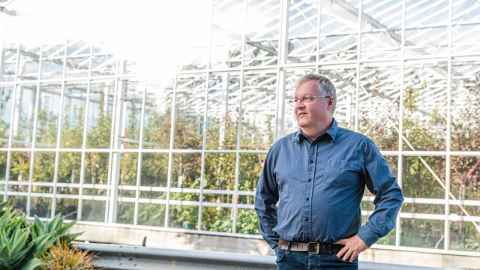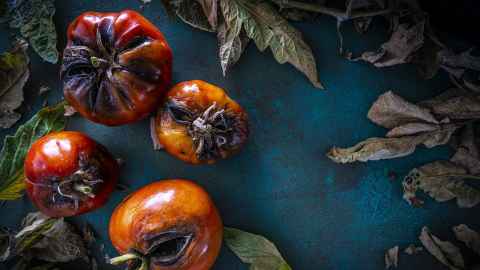The race to develop crops to feed us in a hotter world
8 February 2023
Rather than 'clean and green' is the future for our food crops 'dead and brown'? Researcher Andrew Allan says our time to decide is running out.

Can our crops keep up with climate change? Professor Andrew Allan says this question should be high on New Zealand’s list of priorities. “Our high value crop industries will be hammered by the climate crisis because of warmer winters and really hot summers.”
In the fruit and produce region around Kerikeri, there are already no winter nights colder than 4°C. The chilly nights of winter are crucial for many crops to ‘set’ the spring flowering trigger. As winter temperatures rise, crops will not flower well. Poor, or non-existent flowering means either no fruit or low-quality fruit. At risk is the value gained from premium fruit crops. Think here of everything we and 127 markets overseas love to eat – apples, avocados, kiwifruit and others. Climate change also takes a toll on staples like potatoes and onions.
Allan is a busy man. He is a professor of biological sciences at Waipapa Taumata Rau, University of Auckland, and leads research at Plant and Food Research, the Crown Research Institute. He is working on a five-year $14.5m Endeavour funded project: The Flowering Crisis: Confronting a changing climate’s threat to New Zealand’s tree crops.
He has the right set of skills and experience to lead this challenge. With initial qualifications in plant biology, research has taken him from physiology to molecular biology to genomics. “I’m still basically a plant physiologist. My area of expertise has always been in the stress response of plants to environmental conditions.” At work he is just as likely to be in the glasshouse, examining and propagating new cultivars, as in his office.
About 10 years ago, my children asked: ‘Dad, what are you doing about the climate crisis?'
Research with his then doctoral candidate Richard Espley, now colleague at Plant and Food Research, conclusively mapped the gene that decides the red colour in apples.
Their paper has been highly cited internationally because the world wants fruit and vegetables with strong red colouration, because red in a fruit, berry or leaf means it has a high level of anthocyanins. These compounds are rich in antioxidants. By countering inflammation in the body, antioxidants are thought to have positive health benefits.
Research has linked anthocyanins to everything from improving cardiovascular health to preventing dementia and cancer, though conclusive evidence remains elusive. Apart from plate appeal, the logic is that by consuming red and purple pigmented fruit and vegetables, we can stave off all manner of ills.
His work supporting the development of cultivars to entice new consumers had been his bread and butter. The challenge of climate change on crops is now his focus.
“About 10 years ago, my children asked: ‘Dad, what are you doing about the climate crisis?’” He had no direct answer and realised that he needed to do much more.
Nowadays Andrew is in a race, one that takes place over decades but is no less urgent despite the time span. On one side is the work to develop plant cultivars that can stand up to and even flourish in the hotter world to come. On the other, the shocks and jolts to ecosystems climate change is bringing now. The crops of the near future will need to withstand everything from higher temperatures to the new pests and diseases that will establish themselves in a far less temperate Aotearoa New Zealand, as well as bursts of erratic weather.
Breeding new cultivars is business as usual in horticultural research. “But a climate crisis moves the temperature quicker than we can breed. That’s my biggest worry. Can we breed new cultivars for an altered climate and are we quick enough?”

The Ministry for the Environment has produced scenarios for Aotearoa New Zealand based on global models. The Ministry for the Environment has produced scenarios for Aotearoa New Zealand based on global models. In a best-case scenario, by 2040, in 17 years, the mean temperature will rise in a range between .7 °C and in a worst case 1.0 °C.
By 2090, 57 years away, the worst-case mean temperature rise across the country could be 3°C. Under even the best scenarios, the all-important frosts needed to set fruit will decrease by 30 per cent, in a worst case by 50 per cent, by 2040.
This becomes a clear and present danger to an export sector that earns more than $6bn a year or about 11 per cent of the country’s annual export earnings.
Plant and Food Research already has plant breeding programmes designed to develop cultivars that cope with warmer temperatures. They are trying to grow apples in the warmer winters and hotter summers of Spain and in Kerikeri.
But traditional plant breeding is a methodical process that takes time, up to 20 years to develop a new fruit crop that’s ready for the market.
New Zealand’s most exported tree, Pinus radiata, is technically a juvenile for the first 17 years. It means cross breeding opportunities come in 17-year intervals with further years needed to figure out whether a new cultivar can handle climate change and still fulfil market demand.
Andrew says the only strategy to win the race is speed. “We’re going to have to be fast because the climate crisis is fast. Scientifically, we also must be fast, because that means we can publish first and discover things quickly before others do.”
There is a way to speed the evolution of plants. Genomics is already in use in plant breeding, where researchers use markers for key genes, to know early whether attributes have been passed on to progeny.
Now, he says, New Zealand needs to grapple with the issues around gene editing. In the early years of this century, the prospect of genetically modified organisms was roundly rejected.
Among the arguments against the use of genetic technology was the fear of unintended consequences and that it would damage the country’s clean and green image.
“But what does the climate crisis do to our pure, untainted image? Clean and green could end up brown and dead. This scares the hell out of me.” With the climate crisis time is running out.
Meanwhile in the past decade gene technologies like CRISPR, that enable very precise gene editing, have become a common part of the tool kit in biological and medical research. Gene technology can triple or quadruple the speed with which new crop cultivars are developed.
Inevitably, he says, climate change will change everything we do. With our wealth built on dairy cows, what if large herds of ruminant animals became unviable in a world beset with a rapidly changing climate?
What if, he says, the Canterbury plains, now the home of dairy farms that are only workable due to large scale irrigation schemes, became again a place where New Zealand grows only crops?
“Better crops feed more people. Crops fix carbon dioxide and make the soil better. This could be a win/win/win. But if we are to do this in time, we need new genetic technologies and we need to bring the New Zealand people with us, convince them that this is safe and a good thing.”
Through the lens of academic research Andrew is one of a small number of New Zealand researchers whose publications and citations mean he is listed as among the most highly cited researchers in the world.
The acknowledgement is welcome, but his major driver is to get the things he writes about in his papers into supermarkets. “I want to see people go, ‘Wow, I want to eat that’.”
Plants are a big part of the solution to many of the challenges faced by society. “If we can make plants that are better for us, that are more attractive to eat, then we’ll eat less meat. Eating less meat is good for our health and good for the planet,” he says.
New Zealand researchers are well placed to develop new crops, new varieties and flavours that would flourish in a warmer country. “It’s simple really. We want to stay the same as we were. Well, I understand that, but it’s not an option anymore. The climate crisis is happening and what we have done in the past is not going to work in the future.”
Hīkina kia Tutuki
Rise to meet the challenge
Professor Andrew Allan is one of seven researchers from Waipapa Taumata Rau, University of Auckland who is a 2022 Highly Cited Researcher by Clarivate.
The Highly Cited Researchers list comprise researchers who have published papers that rank in the top one per cent of citations in their field. There are 18 New Zealand researchers on the 2022 list, out of a 2022 global total of 6938.
Story: Gilbert Wong
Mātātaki | The Challenge is a continuing series from the University of Auckland about how our researchers tackle some of the world's biggest challenges. Challenge articles are available for republication.
Media contact
Gilbert Wong | Research Communications manager
E: gilbert.wong@auckland.ac.nz
